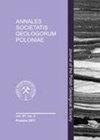东北波西米亚地块晚白垩世古地理:波兰西南部wleski地堑和Krzeszów短向斜的历时沉积序列
IF 0.9
4区 地球科学
Q2 GEOLOGY
引用次数: 1
摘要
本文对wleski地堑和Krzeszów Brachysyncline(苏德海地块东北波西米亚地块)晚白垩世(晚Cenomanian -早Coniacian)的浅海相序列进行了新的沉积学和古地理解释。这两个构造亚单元分别是北苏台德和苏台德内向斜带的异常值,包含了晚白垩世连接北方和特提斯海相省的海道的历时沉积演替遗迹。沉积学研究和相分析结果表明,该走廊内的晚塞诺曼世沉积主要是由风暴波和可能的潮流驱动的前白垩世基岩的强烈原位改造。晚Cenomanian时期,Krzeszów地区以硅屑沉积为主,后为近岸过渡-近岸泥质钙质相沉积,而wleski地区继续以粗粒硅屑相沉积为主。后一地区近岸碎屑带在早Turonian期转变为以近海沉积为主的较宽海峡,wleei和Krzeszów通道相互连通,演变为均匀的全海相沉积海峡。在Turonian中期,海峡的南部逐渐被来自东部的粗颗粒硅塑性物质填满。在Turonian晚期和Coniacian早期,海峡沿着其轴线形成了双向潮流漏斗。wleski地区最年轻的白垩纪地层包括早Coniacian滨面到近海过渡沉积的侵蚀遗迹。较年轻的白垩纪沉积物未被保存,可能是在Wleń-Krzeszów海峡的后三东期(?)构造反转期间被侵蚀的。尽管海峡两岸遗迹之间的距离相对较小,但浅海演替在区域尺度上具有明显的历时性,反映了起伏变化、构造差异沉降和碎屑沉积物供应的相互作用。本文介绍了两个研究区首次详细的沉积学测井资料和化石动植物群的新发现,提出了一种新的古地理解释,并讨论了波西米亚地块东北缘白垩纪Sudetic Wleń-Krzeszów海相海峡源区的影响和发展。本文章由计算机程序翻译,如有差异,请以英文原文为准。
Late Cretaceous palaeogeography of NE Bohemian Massif: diachronous sedimentary successions in the Wleń Graben and Krzeszów Brachysyncline (SW Poland)
This paper provides a new sedimentological and palaeogeographic interpretation of the Late Cretaceous (late Cenomanian to early Coniacian) shallow-marine succession exposed in the Wleń Graben and in the Krzeszów Brachysyncline (NE Bohemian Massif, Sudetic Block). These two tectonic subunits are outliers of the North Sudetic and Intra-Sudetic synclinoriums, respectively, and contain relics of the diachronous sedimentary succession of a seaway linking the Boreal and Tethyan marine provinces during the Late Cretaceous. Results of sedimentological study and facies analysis show that the late Cenomanian sedimentation within this corridor was dominated by strong in situ reworking of the pre-Cretaceous bedrock driven by storm waves and possibly tidal currents. In the latest Cenomanian, siliciclastic sedimentation was followed by the deposition of offshore-transition to offshore muddy calcareous facies in the Krzeszów area, while the deposition of coarse-grained siliciclastic facies continued in the Wleń area. The nearshore clastic belt in the latter area changed into a wider strait dominated by offshore sedimentation in the early Turonian, whereby the interconnected Wleń and Krzeszów passages evolved into a uniform strait of fully-marine sedimentation. In the middle Turonian, the southern part of the strait became progressively filled with coarse-grained siliciclastic material supplied from the east. At the end of the late Turonian and in the early Coniacian, the strait funnelled bi-directional tidal currents along its axis. The youngest Cretaceous strata in the Wleń area comprise erosional relics of the early Coniacian shoreface to offshore-transition deposits. The younger Cretaceous deposits are unpreserved, probably eroded during the post-Santonian(?) tectonic inversion of the Wleń–Krzeszów strait. Despite the relatively small distance between the two relic parts of the strait, the shallow-marine succession reveals distinct diachroneity on a regional scale, reflecting an interplay of eustatic changes, differential tectonic subsidence and clastic sediment supply. This paper presents the first detailed sedimentological logs from the two study areas, with new findings of fossil fauna and flora, proposes a new palaeogeographic interpretation and discusses the influence and development of the source areas for the Cretaceous Sudetic Wleń–Krzeszów marine strait at the NE fringe of the Bohemian Massif.
求助全文
通过发布文献求助,成功后即可免费获取论文全文。
去求助
来源期刊
CiteScore
2.60
自引率
7.70%
发文量
6
审稿时长
>12 weeks
期刊介绍:
Annales Societatis Geologorum Poloniae (ASGP) is the scientific journal of the Polish Geological Society. Original contributions and review articles are considered for publication in Annales Societatis Geologorum Poloniae. Submissions for publication may be from all branches of the geological sciences, including applied and economic geology, as well as discussions of papers, previously published in the journal. The language of the journal is English.

 求助内容:
求助内容: 应助结果提醒方式:
应助结果提醒方式:


